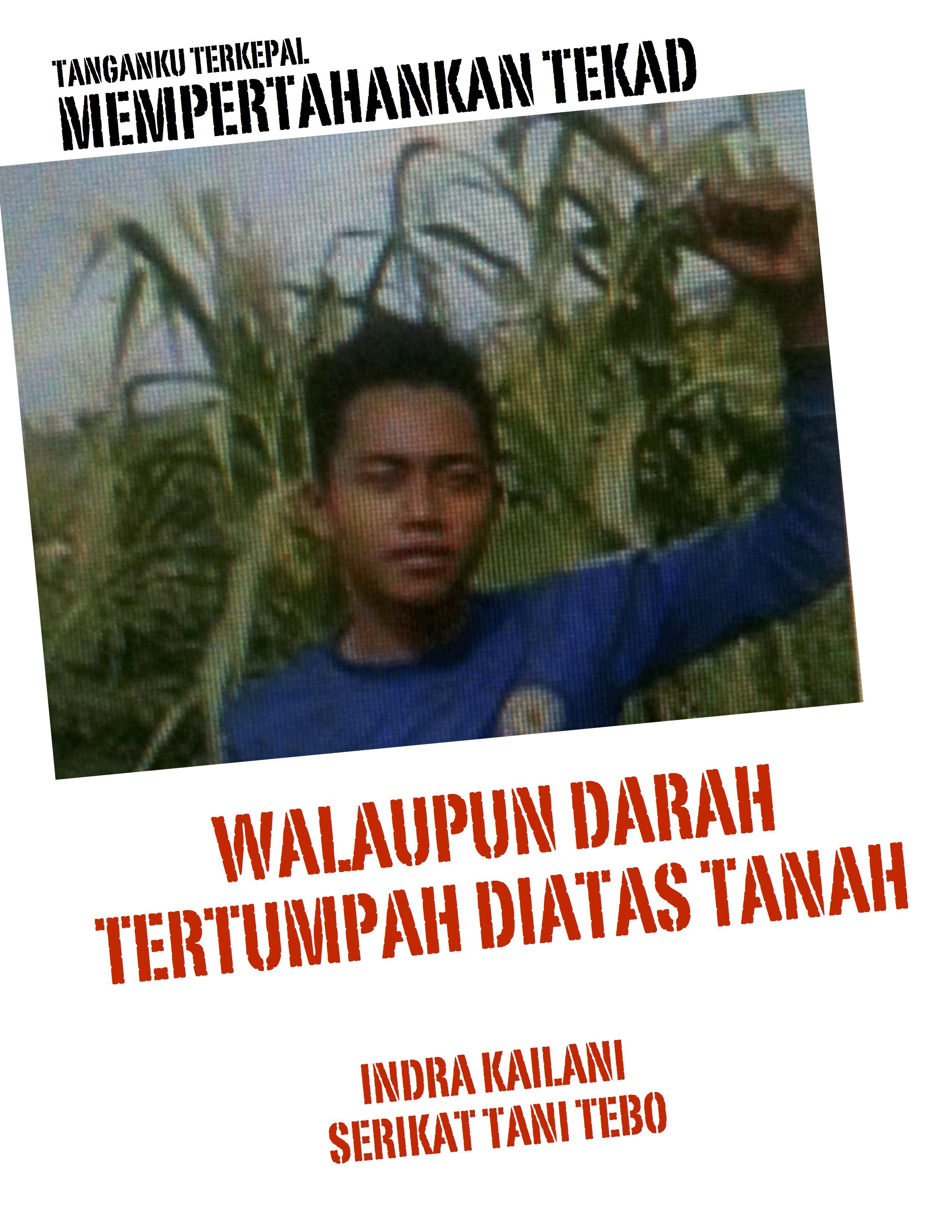28 March 2015 5 menit
[The Jakarta Post] Lives matter most around plantations [re murder of Indra Pelani]

Abetnego Tarigan and Iwan Nurdin, Jakarta | Opinion | Sat, March 28 2015, 10:09 AM
The recent torture and murder of Indra Pelani is a shocking tragedy. It’s a tragedy for his family, his community and all those who are risking their lives to advance rights and justice — and also for the company whose subsidiary employed the guards who reportedly killed him.
This murder was not just a random act, nor due solely to a local land rights conflict, but rather to the more widely entrenched industrial plantation system whereby whole swaths of rural land have been taken from locals without their consent.
Companies have militarized the protection of their plantations and their armed guards routinely act violently and with impunity.
The long-standing criminalization of local people in accessing their own, traditional lands and forests has resulted in tragic abuse, violent conflict, murder and the destruction of communities for decades across Indonesia.
Indigenous peoples and peasant communities have been calling for this outrageous injustice to end for many years. The government and the plantation companies have been indefensibly slow to react.
Tragically, international focus on the companies involved has been on their environmental, rather than their human rights abuses.
Company adoption of forest conservation policies has been a welcome step forward, but the same focus has not come for human rights and land rights.
Environmental organizations and their supporters have clearly been more concerned with protecting biodiversity and carbon stocks than with lives, land rights, livelihoods or cultural survival.
And that tragic fact should be as unsettling to us as the news about the torture and murder of a 22-year-old man, who happened to be on his way to harvest rice in his communities’ field one Friday afternoon in February.
Of course, biodiversity, carbon and climate change matter, but lives matter most.
If anything positive is to come from this tragedy, surely it would be for the companies and the environmental groups involved to prioritize the lives and rights of humans.
Three steps are required for this shift to happen and for companies involved to demonstrate that they are seriously committed to rectifying the historic abuse of Indonesia’s people and their land.
First, company leadership needs to develop detailed corporate policies on human rights and land rights that are consistent with international standards if they have not already done so and then swiftly implement, from top-to-bottom, retraining of all staff throughout their companies, subsidiaries and contracted firms.
Leaders must then hold staff, subsidiaries and contractors accountable for their performance relating to these new policies.
Second, companies — and the international environmental NGOs engaging with them — need to commit to and prioritize the implementation of programs to formally recognize the customary land rights of indigenous peoples and communities, and either return those lands or renegotiate contracts, if that is the communities’ wish.
Companies need to deal with their unjust legacies as well as observe international standards for all new lands they acquire. The internationally agreed upon Voluntary Guidelines for the Responsible Governance of Tenure of Land, Fisheries and Forests, of which Indonesia is a signatory, is a good framework to adopt, and operational guidance for companies is already being developed by a group of leading companies and civil society organizations.
Third, companies need to commit to conducting regular, independent and fully transparent audits of their performance on human and land rights by international human rights organizations.
Leading forestry and food and agriculture companies have conducted such assessments across their multi-national holdings in recent years — proving that it is not only possible, but advantageous for their companies to do so.
The above steps, if taken by companies and environmental organizations would constitute a historic pivot towards justice and respect of Indonesia’s citizens, but they will not be adequate without much greater government action.
By failing to enforce its own laws or adhere to the international standards to which it has committed, and by continuing to encourage industrial concessions of all types without first recognizing and respecting local people’s land rights, the Indonesian government has set the stage for the horrific abuse, conflict and death that is far too common across the archipelago.
President Joko “Jokowi” Widodo’s pledge to respect local peoples’ land rights, making it one of his administration’s nine priorities (Nawacita), provides hope that this history of injustice can finally begin to be reversed.
Sadly, Indra Pelani is far from the first young man or woman to die needlessly at the hands of the plantation industry — but he can be the last.
Over recent years a number of companies have made important steps forward and begun to address some local conflicts.
But neither the companies nor the environmental groups advocating their reforms have prioritized remedying the legacy of land grabs and violence against local people. This has to change. Lives matter most.
_________________
Abetnego Tarigan is executive director of the environmental NGO Walhi. Iwan Nurdin is the secretary-general of the Agrarian Reform Consortium (KPA).
Link:
http://www.thejakartapost.com/news/2015/03/28/lives-matter-most-around-plantations.html
